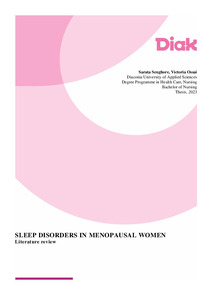SLEEP DISORDERS IN MENOPAUSAL WOMEN
Senghore, Sarata; Ossai, Victoria (2023)
Senghore, Sarata
Ossai, Victoria
2023
All rights reserved. This publication is copyrighted. You may download, display and print it for Your own personal use. Commercial use is prohibited.
Julkaisun pysyvä osoite on
https://urn.fi/URN:NBN:fi:amk-2023060521269
https://urn.fi/URN:NBN:fi:amk-2023060521269
Tiivistelmä
The aim of this thesis is to improve nursing knowledge in sleep quality among menopausal sleep disorders. The research question focuses on identifying knowledge that is needed to improve sleep quality in the female population.
The authors conducted a qualitative literature review and used content analysis to analyze the data. The authors used an inductive approach to discover new information and perspectives.
The inclusion criteria for research articles include English language, online avail ability, and relevance to the research question. Exclusion criteria are articles older than 10 years (CINALH Full text, PubMed, Science Direct) or older than 5 years (Academic Search Complete, Google Scholar, Springer Link), published in other languages than English, and articles with no free access.
Sleep disorders such as obstructive sleep apnea and restless legs syndrome are common in menopausal women and can be measured by polysomnography, actigraphy, and global questionaries. Several factors affect the quality of sleep in menopausal women. When sleep is affected, there are implications. However, there are different non-pharmacological treatments for sleep disorders that can be used to improve sleep quality. Jean Watson’s theory of human care can guide nurses in providing patient care to women with sleep disorders during meno pause.
Improving nurses’ knowledge of sleep disorders in menopausal women is essen tial to improve sleep quality and overall health. A strong patient-nurse relationship is critical for proper assessment and treatment. However, the study’s strengths include diverse groups of women benefiting from the findings and the various interventions to improve sleep quality. Limitations include limited access to rele vant articles
The authors conducted a qualitative literature review and used content analysis to analyze the data. The authors used an inductive approach to discover new information and perspectives.
The inclusion criteria for research articles include English language, online avail ability, and relevance to the research question. Exclusion criteria are articles older than 10 years (CINALH Full text, PubMed, Science Direct) or older than 5 years (Academic Search Complete, Google Scholar, Springer Link), published in other languages than English, and articles with no free access.
Sleep disorders such as obstructive sleep apnea and restless legs syndrome are common in menopausal women and can be measured by polysomnography, actigraphy, and global questionaries. Several factors affect the quality of sleep in menopausal women. When sleep is affected, there are implications. However, there are different non-pharmacological treatments for sleep disorders that can be used to improve sleep quality. Jean Watson’s theory of human care can guide nurses in providing patient care to women with sleep disorders during meno pause.
Improving nurses’ knowledge of sleep disorders in menopausal women is essen tial to improve sleep quality and overall health. A strong patient-nurse relationship is critical for proper assessment and treatment. However, the study’s strengths include diverse groups of women benefiting from the findings and the various interventions to improve sleep quality. Limitations include limited access to rele vant articles
